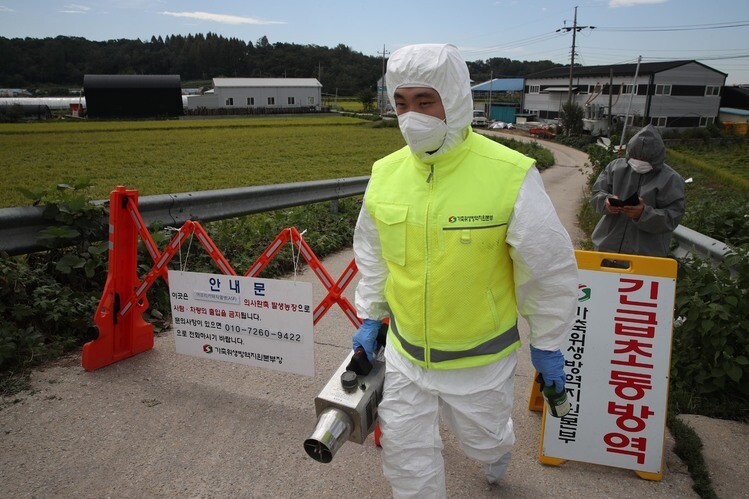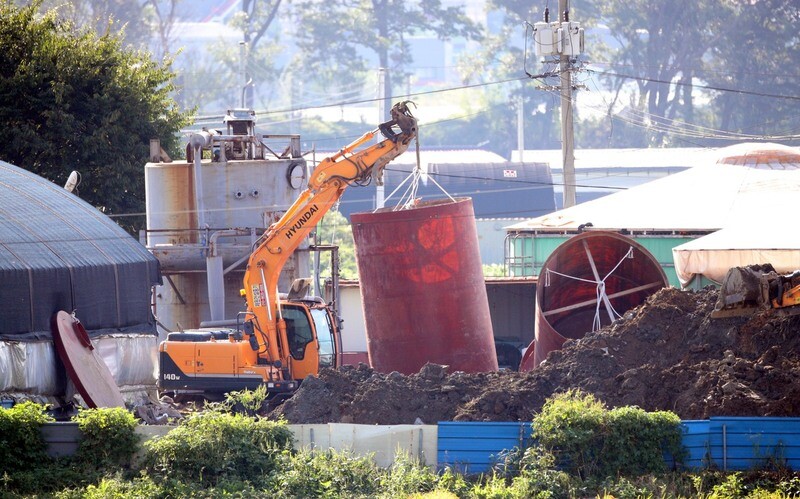hankyoreh
Links to other country sites 다른 나라 사이트 링크
African swine fever spreads across South Korean at with alarming speed

“I knew it was going to come at some point. I just didn’t think it would happen so soon.”
Lee Un-sang, the 74-year-old chairman of the Paju pork producers’ association, let out a long sigh as he spoke. At 3 pm on Sept. 17, excavators went to work digging up dirt and burying all 3,950 pigs from a pig farm near the Yeondasan neighborhood in Paju, Gyeonggi Province, where cases of swine fever were confirmed to have occurred, along with two other nearby family-run farms. The agency responsible for the culling separated the pigs into 10 30-ton fiber-reinforced plastic (FRP) tanks and buried them in sites on the farms.
“There’s not very much you can do besides thorough pen sterilization and restrictions on outside travel, so people are very worried,” Lee said.
The sense of concern is growing among swine farmers with the breaching of control measures against the spread of African swine fever. After previously having to bury some 1.2 million pigs due to an outbreak of foot-and-mouth disease in Andong, North Gyeongsang Province, on Nov. 28, 2010, swine farmers were visibly fearful that the African swine fever situation could turn into a repeat of the same episode.
“We’ve put up a control line at the farm entrance to restrict people and vehicles from coming and going, but it’s worrying. We’re hoping a vaccine can be produced quickly,” said a 57-year-old farmer surnamed Seong, who is raising 950 pigs in Yeoncheon.
Another swine farmer said, “Fortunately enough, there aren’t any swine farms near the one where the outbreak occurred, which I think will help with the control measures.”
“The contagion also isn’t spreading as fast as the foot-and-mouth disease, so I’m anticipating that with good control measures, it won’t spread as far as it did in Vietnam,” the farmer added hopefully.

Gyeonggi Province placed restrictions on movement for all swine farms in the Paju area as of 6 pm on Sept. 16, when a report on the deaths of five brood sows at one farm was reported. On the morning of Sept. 17, around 140 government officials were sent to 12 locations in the Paju region to manage 24 control posts. Sterilization base facilities were also set up at three locations: the agricultural technology center, Nakha Village in Tanhyeon Township, and Duji Village in Jeokseong Township. In an emergency video conference with deputy local government heads within the province that morning, Gyeonggi Gov. Lee Jae-myung promised to “marshal all resources from the early stages to prevent a spread.”
But fears have been growing amid reports that 198 pigs from the Paju farm where African swine fever cases were confirmed were transported to slaughterhouses in Incheon and Gimpo over the past 10 days, as well as news that the Paju farm was recently visited by livestock industry officials in South Chungcheong Province, which is home to South Korea’s largest swine farming complex.
“While it was not distributed commercially, there is the possibility of the virus being transferred during the transport process, so we’re currently tracking that,” said an official from the Gyeonggi Province animal health and hygiene division.
Local governments throughout South Korea sprang into action to control the outbreak, including bans on the transporting of pigs within their borders. Gangwon Province, which neighbors Gyeonggi, set up a prevention headquarters headed by its governor to implement controls on the Demilitarized Zone (DMZ). A livestock health official with South Chungcheong Province explained, “The livestock transport vehicles and livestock industry officials that visited the Paju farm were confirmed to have gone to 10 places on Aug. 27 and between Aug. 29 and Sept. 11, including seven farms, one slaughterhouse, and two feed factories in South Chungcheong.” In addition to controlling access to the facilities in question, other countermeasures by South Chungcheong Province include tracing the numbers and destinations of 1,600 pigs transported on Sept. 16 from farms related to the outbreak and sterilizing the slaughterhouses where they were killed.
The provinces of South Gyeongsang, North Chungcheong, and North and South Jeolla also began implementing control measures including application of quicklime and repellent agents. Jeju Island has banned the importation of pork from all other regions apart from processed livestock foods that have undergone heat treatment.
By Park Kyung-man, North Gyeonggi correspondent
Please direct comments or questions to [english@hani.co.kr]

Editorial・opinion
![[Guest essay] Maybe Korea’s rapid population decline is an opportunity, not a crisis [Guest essay] Maybe Korea’s rapid population decline is an opportunity, not a crisis](https://flexible.img.hani.co.kr/flexible/normal/500/300/imgdb/original/2024/0430/9417144634983596.jpg) [Guest essay] Maybe Korea’s rapid population decline is an opportunity, not a crisis
[Guest essay] Maybe Korea’s rapid population decline is an opportunity, not a crisis![[Column] Can Yoon steer diplomacy with Russia, China back on track? [Column] Can Yoon steer diplomacy with Russia, China back on track?](https://flexible.img.hani.co.kr/flexible/normal/500/300/imgdb/original/2024/0430/1617144616798244.jpg) [Column] Can Yoon steer diplomacy with Russia, China back on track?
[Column] Can Yoon steer diplomacy with Russia, China back on track?- [Column] Season 2 of special prosecutor probe may be coming to Korea soon
- [Column] Park Geun-hye déjà vu in Yoon Suk-yeol
- [Editorial] New weight of N. Korea’s nuclear threats makes dialogue all the more urgent
- [Guest essay] The real reason Korea’s new right wants to dub Rhee a founding father
- [Column] ‘Choson’: Is it time we start referring to N. Korea in its own terms?
- [Editorial] Japan’s rewriting of history with Korea has gone too far
- [Column] The president’s questionable capacity for dialogue
- [Column] Are chaebol firms just pizza pies for families to divvy up as they please?
Most viewed articles
- 1Under conservative chief, Korea’s TRC brands teenage wartime massacre victims as traitors
- 2[Guest essay] Maybe Korea’s rapid population decline is an opportunity, not a crisis
- 3Value of Korean won down 7.3% in 2024, a steeper plunge than during 2008 crisis
- 4Months and months of overdue wages are pushing migrant workers in Korea into debt
- 5[Column] Can Yoon steer diplomacy with Russia, China back on track?
- 6After election rout, Yoon’s left with 3 choices for dealing with the opposition
- 7Two factors that’ll decide if Korea’s economy keeps on its upward trend
- 8First meeting between Yoon, Lee in 2 years ends without compromise or agreement
- 9‘We must say no’: Seoul defense chief on Korean, USFK involvement in hypothetical Taiwan crisis
- 10Strong dollar isn’t all that’s pushing won exchange rate into to 1,400 range